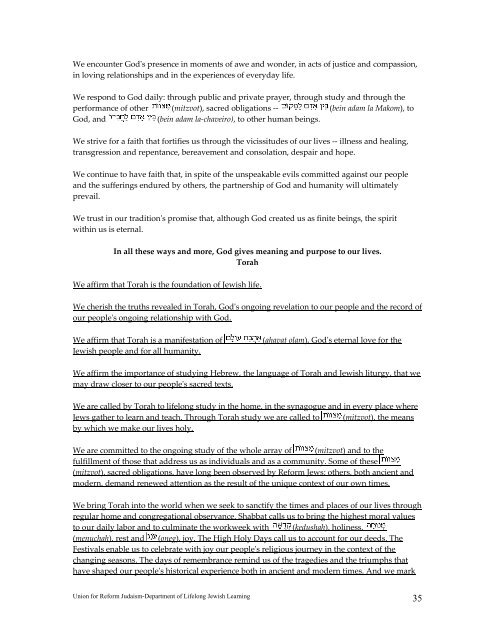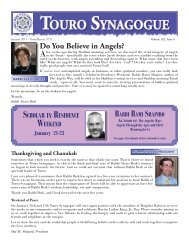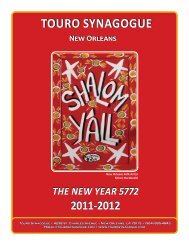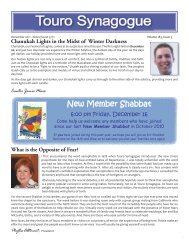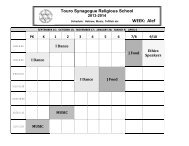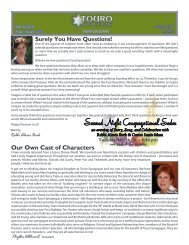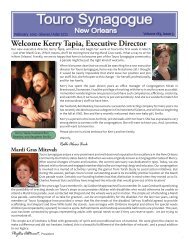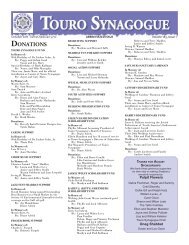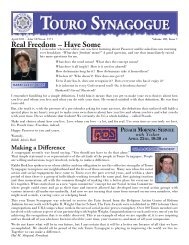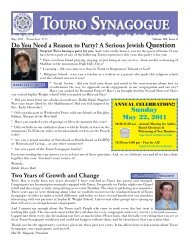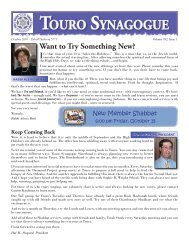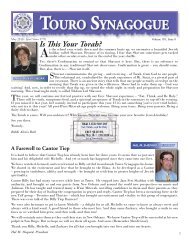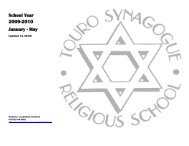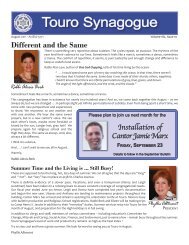Reform Judaism for Teachers module - Touro Synagogue
Reform Judaism for Teachers module - Touro Synagogue
Reform Judaism for Teachers module - Touro Synagogue
You also want an ePaper? Increase the reach of your titles
YUMPU automatically turns print PDFs into web optimized ePapers that Google loves.
We encounter Godʹs presence in moments of awe and wonder, in acts of justice and compassion,<br />
in loving relationships and in the experiences of everyday life.<br />
We respond to God daily: through public and private prayer, through study and through the<br />
per<strong>for</strong>mance of other (mitzvot), sacred obligations ‐‐ (bein adam la Makom), to<br />
God, and (bein adam la‐chaveiro), to other human beings.<br />
We strive <strong>for</strong> a faith that <strong>for</strong>tifies us through the vicissitudes of our lives ‐‐ illness and healing,<br />
transgression and repentance, bereavement and consolation, despair and hope.<br />
We continue to have faith that, in spite of the unspeakable evils committed against our people<br />
and the sufferings endured by others, the partnership of God and humanity will ultimately<br />
prevail.<br />
We trust in our traditionʹs promise that, although God created us as finite beings, the spirit<br />
within us is eternal.<br />
In all these ways and more, God gives meaning and purpose to our lives.<br />
Torah<br />
We affirm that Torah is the foundation of Jewish life.<br />
We cherish the truths revealed in Torah, Godʹs ongoing revelation to our people and the record of<br />
our peopleʹs ongoing relationship with God.<br />
We affirm that Torah is a manifestation of (ahavat olam), Godʹs eternal love <strong>for</strong> the<br />
Jewish people and <strong>for</strong> all humanity.<br />
We affirm the importance of studying Hebrew, the language of Torah and Jewish liturgy, that we<br />
may draw closer to our peopleʹs sacred texts.<br />
We are called by Torah to lifelong study in the home, in the synagogue and in every place where<br />
Jews gather to learn and teach. Through Torah study we are called to (mitzvot), the means<br />
by which we make our lives holy.<br />
We are committed to the ongoing study of the whole array of (mitzvot) and to the<br />
fulfillment of those that address us as individuals and as a community. Some of these<br />
(mitzvot), sacred obligations, have long been observed by <strong>Re<strong>for</strong>m</strong> Jews; others, both ancient and<br />
modern, demand renewed attention as the result of the unique context of our own times.<br />
We bring Torah into the world when we seek to sanctify the times and places of our lives through<br />
regular home and congregational observance. Shabbat calls us to bring the highest moral values<br />
to our daily labor and to culminate the workweek with (kedushah), holiness,<br />
(menuchah), rest and (oneg), joy. The High Holy Days call us to account <strong>for</strong> our deeds. The<br />
Festivals enable us to celebrate with joy our peopleʹs religious journey in the context of the<br />
changing seasons. The days of remembrance remind us of the tragedies and the triumphs that<br />
have shaped our peopleʹs historical experience both in ancient and modern times. And we mark<br />
Union <strong>for</strong> <strong>Re<strong>for</strong>m</strong> <strong>Judaism</strong>-Department of Lifelong Jewish Learning<br />
35


